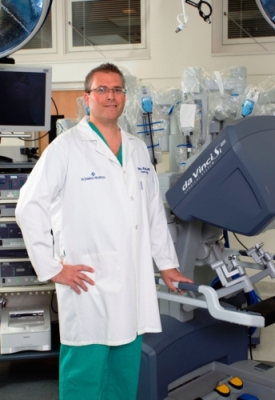Dec 29 2012
After 12-year-old Steven Kraguliac began experiencing bouts of pain in his right side, an ultrasound revealed that fluid was backing up into his kidneys as a result of a bilateral ureteral obstruction. His physician referred him to St. Joseph's Children's Hospital Pediatric Urologist Dr. Ethan Polsky , who specializes in pediatric urology surgery.
 St. Joseph's Children's Hospital is the only hospital in the Tampa Bay area offering robot-assisted urologic procedures for children, and all are performed by Dr. Ethan Polsky using the da Vinci Surgical System. (PRNewsFoto/St. Joseph's Children's Hospital)
St. Joseph's Children's Hospital is the only hospital in the Tampa Bay area offering robot-assisted urologic procedures for children, and all are performed by Dr. Ethan Polsky using the da Vinci Surgical System. (PRNewsFoto/St. Joseph's Children's Hospital)
Dr. Polsky informed the family that surgery is the only option for repairing a bilateral obstruction and indicated that Steven would be a great candidate for robotic surgery. While Steven thought being operated on with the help of a robot was "cool," his mother, who works in the medical field, knew it meant much more.
"I was pleased to learn that Dr. Polsky wanted to perform robot-assisted surgery because I knew it meant less risk for infection, smaller scars and that my son would recover quicker," said Svetlana Kraguliac.
Robot-assisted surgery is like other minimally invasive procedures, in that flexible working instruments and camera are inserted through small incisions. The surgeon, however, controls the instruments from a console near the patient.
"The cameras provide a three-dimensional, high-quality look inside the body, and the instruments, which I control from the console, are like miniature versions of my own hands, but with far greater dexterity and steadiness," said Dr. Polsky.
St. Joseph's Children's Hospital is the only hospital in the Tampa Bay area offering robot-assisted urologic procedures for children, and all are performed by Dr. Polsky using the da Vinci Surgical System. Pediatric urologic conditions Dr. Polsky treats through robotic surgery include:
- Ureteropelvic junction (UPJ) obstruction: a blockage in the area that connects the kidneys to the ureters (the tubes that move urine to the bladder)
- Kidney disease, including removal of kidney robotically
- Vesicoureteral reflux: a bladder abnormality that causes urine to flow back toward the kidney
According to Dr. Polsky, the ultimate outcome of performing either open surgery or minimally invasive surgery is about equal. However, there are several benefits to robot-assisted surgery that make it a great option for young patients.
"Robotic surgery is less invasive and more precise, and since there is less manipulation of the healthy tissue, the child feels less pain and is able to quickly return to their normal routine," Dr. Polsky said. "And on a much lighter note, kids just like the idea of having a robot in the operating room."
Since Steven's ureteral obstruction occurred in two areas, Dr. Polsky performed the repairs during two separate robotic procedures. Steven recovered quickly after both procedures, and according to his mother, he is now back to being a healthy and active boy who is looking forward to being a teenager in a few months.
St. Joseph's Hospitals are the region's leaders in performing all types of minimally invasive surgery, including robotic surgery. With two robots and 25 robotic surgeons on staff, St. Josephs Hospitals treat a wide range of conditions in both adults and children. For more information on robotic surgery and whether or not it might be an option for your child's urological condition, visit: StJosephsChildrens.com.